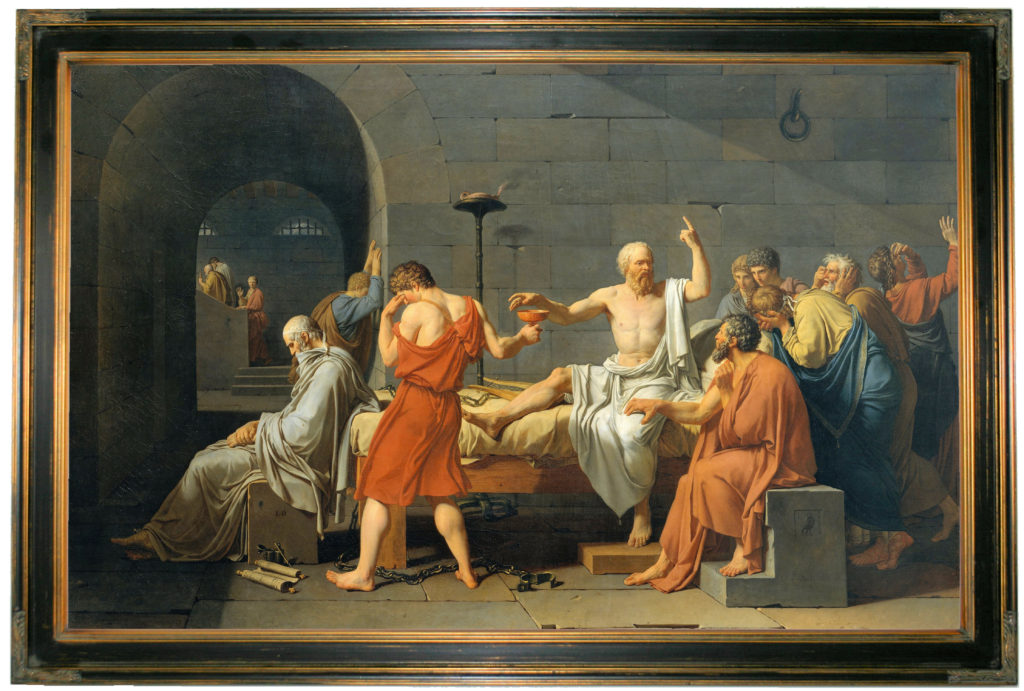Monday
A recent Atlantic article on Covid patients dying alone turns to literature to capture one of the ensuing tragedies: they fail to impart their final words. “What the dying have to say must be heard,” Zeynep Tufekci observes:
The paramount importance of dying words has long been recognized across cultures. “When a bird is about to die, his song is sad,” Master Tseng, a Confucian leader, says in the more than two-millennia-old Analects of Confucius. “When a man is about to die, his words are true.” In Plato’s Phaedo, Socrates notes how swans sing most beautifully just as they are about to die. That concept of the swan song—one’s last, most beautiful expression—also comes up in Aesop’s fables and in Aeschylus’s Agamemnon, and was already a proverb by the third century BCE. In Shakespeare’s Richard II, a dying John of Gaunt, hoping the king will come to hear his last words, says:
O, but they say the tongues of dying men
Enforce attention like deep harmony.
Where words are scarce they are seldom spent in vain,
For they breathe truth that breathe their words in pain…
I had to think twice about Agamemnon, but I assume Tufekci has in mind Cassandra forseeing her impending death. Because of Apollo’s curse, she is not at first believed by the chorus, but by the end they start to sense that she is saying something of paramount importance:
Chorus: Too plain is all, too plain! A child might read aright thy fateful strain. Deep in my heart their piercing fang Terror and sorrow set, the while I heard That piteous, low, tender word, Yet to mine ear and heart a crushing pang. Cassandra (chanting): Woe for my city, woe for Ilion's fall! Father, how oft with sanguine stain Streamed on thine altar-stone the blood of cattle, slain That heaven might guard our wall! But all was shed in vain. Low lie the shattered towers whereas they fell, And I--ah burning heart!--shall soon lie low as well.
This concluding dialogue is as bleak as anything to be found in literature: Trojan appeals to the gods came to naught and, with the murder of Agamemnon, the Greek victory proves similarly empty. If anything, Cassandra’s words force us to the reckoning found in Ecclesiastes: “All is vanity.”
In one way, however, the Cassandra example undercuts Tufecki’s point, as does the John of Gaunt passage. Richard II, after all, ignores Gaunt, with the result that he loses both crown and life to Henry Bolingbroke. What good are last words if those who hear them simply ignore them?
The same can be said for King Lear’s final words. After he utters them, Albany abdicates and Kent (it appears) goes off to die. Here they are, delivered as he mourns Cordelia:
And my poor fool [dear] is hang'd! No, no, no life!
Why should a dog, a horse, a rat, have life,
And thou no breath at all? Thou'lt come no more,
Never, never, never, never, never!
Pray you, undo this button: thank you, sir.
Do you see this? Look on her, look, her lips,
Look there, look there!
I’m on the hunt, then, for literary last words that lead to positive outcomes. Dante’s Purgatorio has instances of deathbed conversions that allow people to escape Inferno, but those presumably can occur with or without witnesses. (It’s enough that God hears them.) What about those that lead to epiphanies or dramatic turnarounds?
My first positive example is death bed advice from someone who doesn’t actually die. Everyone thinks that Henry Fielding’s Squire Allworthy is about to depart this world, however, and the words chart the path Tom Jones must follow if he is to achieve final happiness:
Allworthy then gently squeezed his hand, and proceeded thus: “I am convinced, my child, that you have much goodness, generosity, and honor, in your temper: if you will add prudence and religion to these, you must be happy; for the three former qualities, I admit, make you worthy of happiness, but they are the latter only which will put you in possession of it.
An even better example is big-hearted Pilate’s final words to Milkman after being shot by Guitar in Toni Morrison’s Song of Solomon:
Milkman moved his hand over her chest and stomach, trying to find the place where she might be hit. “Pilate? You okay?” He couldn’t make out her eyes. His hand under her head was sweating like a fountain. “Pilate?”
She sighed. “Watch Reba for me.” And then, “I wish I’d a knowed more people. I would of loved’em all. If I’d a knowed more, I woud a loved more.”
This moment contributes to Milkman’s (perhaps metaphorical) flight at the end of the book:
Now he knew why he loved her so. Without ever leaving the ground, she could fly. “There must be another one like you,” he whispered to her. “There’s got to be at least one more woman like you.”
The lost boy has found identity and purpose. Pilate’s words are the final articulation he needs.
What if he had missed them because she was in a Covid intensive care unit?


